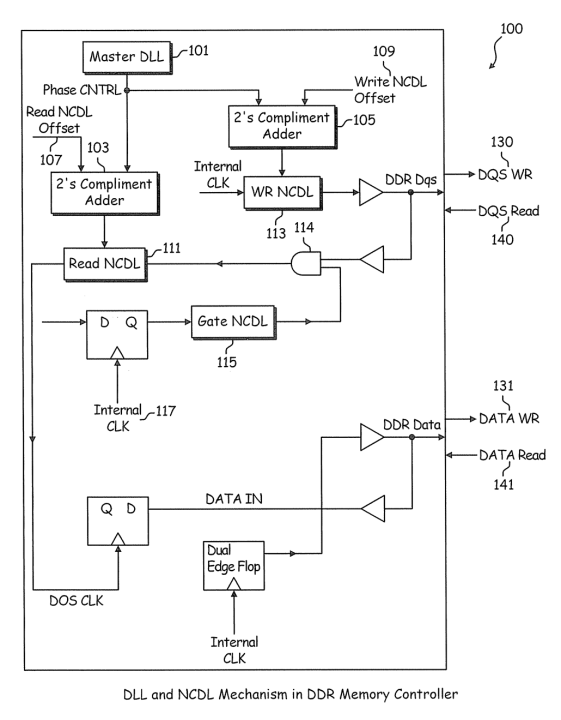Why DNA Ancestry Testing Matters for You, Your Dog, and All Life on Earth
Advances in DNA testing technology are driving discovery, innovation, and growth for businesses as well as academic and government institutions in genomics and related fields.
Currently, researchers are planning the Earth BioGenome Project (EBP), with the objective of creating an “open digital repository of genomic information for life on Earth.” The EBP aims to sequence and analyze the genomes of all eukaryotes (the domain of most visible life on Earth, including plants and animals) over a period of 10 years. While recognizing that the EBP may be the most ambitious endeavor made in the history of biological science, the authors of the EBP proposal believe that its success could change the world:
“If successful, the EBP will completely transform our scientific understanding of life on earth and provide new resources to cope with the rapid loss of biodiversity and habitat changes that are primarily due to human activities and climate change. Fundamental knowledge of Earth’s biodiversity may also lead to new food sources, revolutionary bio-inspired materials, and innovations to treat human, animal, and plant diseases…The greatest legacy of the EBP will be the gift of knowledge—a complete Digital Library of Life that contains the collective biological intelligence of 3.5 billion years of evolutionary history. This knowledge will guide future discoveries for generations and may ultimately determine the survival of life on our planet.”
On the business side of this field, the global genomics market is projected to reach a size of $27.6 billion by 2025. Expansions in the reproductive health, oncology, consumer, and population applications of gene sequencing have created significant new market opportunities, attracting both corporate and academic interest in commercializing the results of DNA research. As with most rapidly growing industries, there is no shortage of courtroom debates over ownership of patents and trademarks on genetics tools, techniques, and discoveries.
Patenting the results of scientific research has been a cause of controversy since the 1970s. More than 4,300 human genes were patented prior to a Supreme Court decision invalidating them in June 2013, which ruled that “DNA…is a product of nature and not patent eligible merely because it has been isolated.” Despite this, intellectual property has played a significant role in the constantly changing world of genomics, particularly over the last decade.
Genomics Litigation Activity and Intellectual Property Filings
Patent infringement is a growing concern for companies developing DNA testing technologies. Litigation over related intellectual property is likely to only increase as businesses and academic institutions continue devoting resources to genomics research and product development.
The Broad Institute (a community of leading Boston-area scientific institutions including MIT and Harvard) is fighting the University of California over CRISPR patents. The Broad Institute is currently one of the largest CRISPR patent holders, as mentioned in a discussion of CRISPR licensing opportunities.
Ancestry.com and 23andMe, top competitors in the commercial market for genetic testing services, are already battling in court over patent infringement, misleading claims, and trademark rights for the word “ancestry.”
Not coincidentally, both of these companies have recently filed trademarks playing off the word “tree.” As seen in ktMINE searches of these companies’ filings, 23andMe has been issued a trademark on “Grandtree.” Ancestry.com has a currently pending trademark application for “Ancestree,” perhaps as a strategy to lock down and protect the company’s association with “ancestry” regardless of the outcome of the previously mentioned court case.
23andMe Grandtree Trademark

Source: ktMINE IP Platform contains millions of trademarks and assignments
Ancestry.com Ancestree Trademark

Source: ktMINE IP Platform contains millions of trademarks and assignments
Beyond their courtroom clashes and similar wordplay in trademark filings, what are some areas these two big players in the genetics testing space might be looking to break into in the future? A look at their intellectual property filings offers some insights.
23andMe IP: Don’t Forget Your Pets
23andMe has filed a trademark for “39andK9,” for “scientific and technological services, namely, providing scientific analysis and informational reports based upon results of laboratory testing in the fields of genetics and animal genetics.” (Dogs have 39 chromosomes compared to humans’ 23.)
23andMe’s 39andK9 Trademark
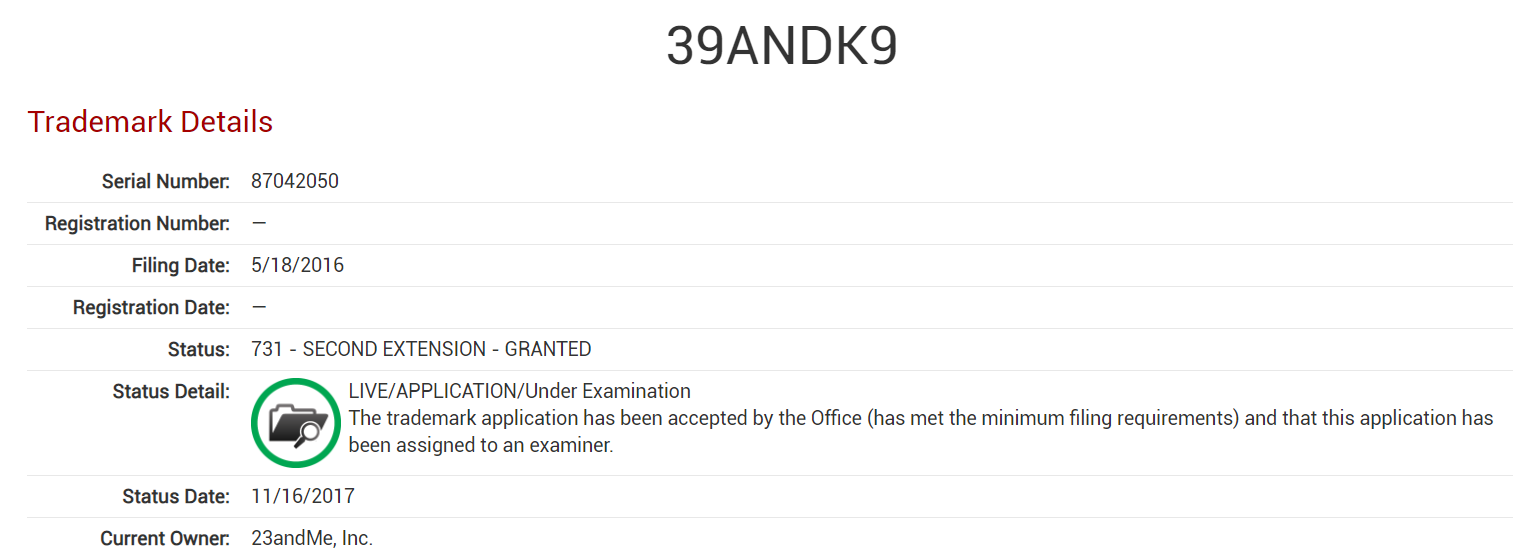
Source: ktMINE IP Platform contains millions of trademarks and assignments
Pet genetic testing, while not without its own issues, can provide valuable information about breeds, from expected physical characteristics to disease possibilities. Dog DNA can even be tested to determine whether a dog has any recent non-dog ancestors–a wolf- or coyote-hybrid test. 23andMe doesn’t currently offer any genetic testing kits for dogs, although potential development of such a product has been on the company’s radar since at least 2010.
@borismus Our side business, 39andK9, is still in development 🙂
— 23andMe (@23andMe) December 20, 2010
23andMe’s “39andK9” trademark is currently under intent-to-use (ITU) status, which means the company has agreed to put the mark into use within six months of the issuance of a Notice of Allowance by the USPTO. The prosecution history on ktMINE’s trademark details page for this filing summarizes the latest actions on this mark.
39andK9 Trademark Prosecution History
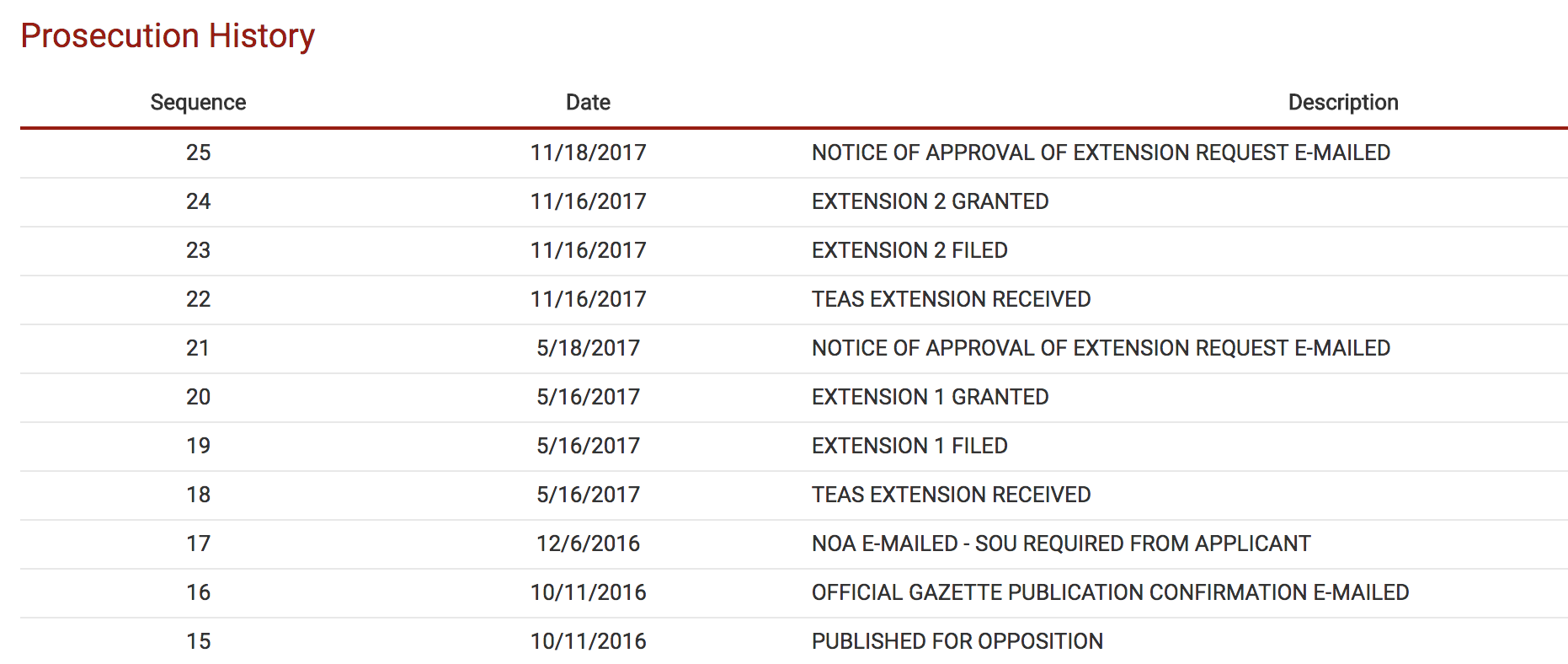
Source: ktMINE IP Platform
Companies are allowed to file up to four extension requests, each of which allows six more months to use a trademark in commerce. 23andMe last filed and was granted their second of four extension requests in November of 2017, which means the company is overdue for either bringing a 39andK9 product to market or filing a third extension. This trademark registration may soon be canceled for non-use; the company will need to take action soon to successfully utilize the “39andK9” mark with entry into the dog genetic testing market.
Anne Wojcicki, who co-founded 23andMe, recently backed the funding of startup Embark Veterinary. Embark provides canine genetic testing and ancestry services. Embark’s CEO Ryan Boyko has stated that “what we offer is, in some sense, the 23andMe for dogs,” and its website includes a customer testimonial describing Embark’s services as “above and beyond other DNA tests…like a 23andMe for your dog,” suggesting that perhaps some sort of informal business relationship exists between the two companies.
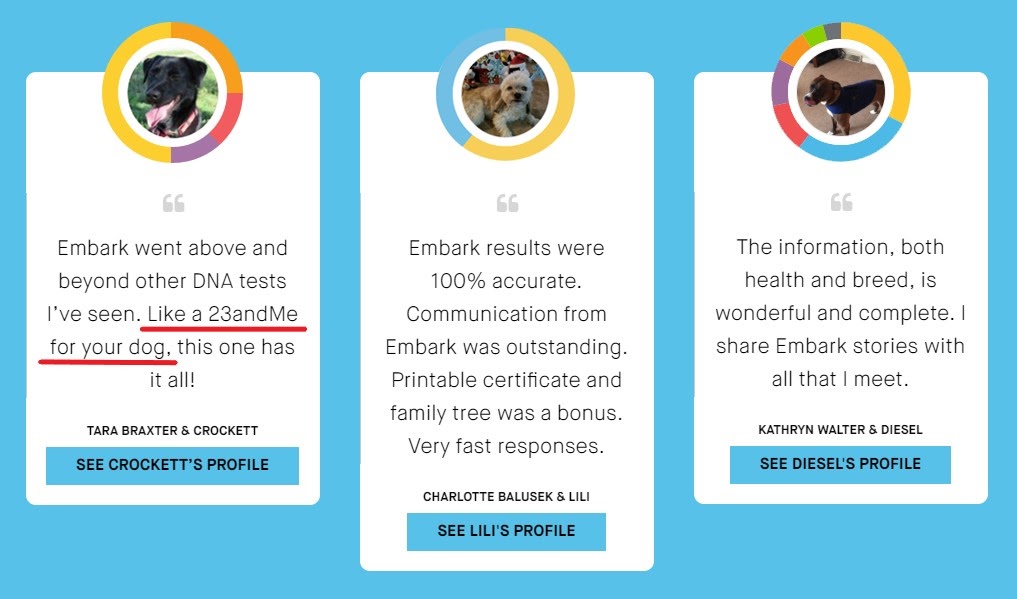
Source: https://embarkvet.com/
Whether or not 23andMe ultimately intends to provide similar services, the company appears to be paying close attention to this offshoot of the human genetic testing industry.
Ancestry.com IP: Towards a World Family Tree
Ancestry.com has filed several patents related to digitizing historical documents and photographs and automating the process tying them to specific dates, people, and places.
Ancestry.com Patent #US9792520B2

Ancestry.com Patent #US9767353B2

Ancestry.com Patent #WO2017006484A1

Source: ktMINE IP Platform contains millions of trademarks and assignmentsThis suggests that Ancestry will continue focusing on piecing together family trees and finding connections within and among historical records using both genetic data and primary source documents. Additional patents for “Discovering population structure from patterns of identity-by-descent” and “System and method for creating a family tree data structure” could point to a potential long-term goal of creating an ultimate family tree of the world’s population, as does the company’s active trademark on the phrase “World Family Tree.”
Ancestry.com World Family Tree Trademark
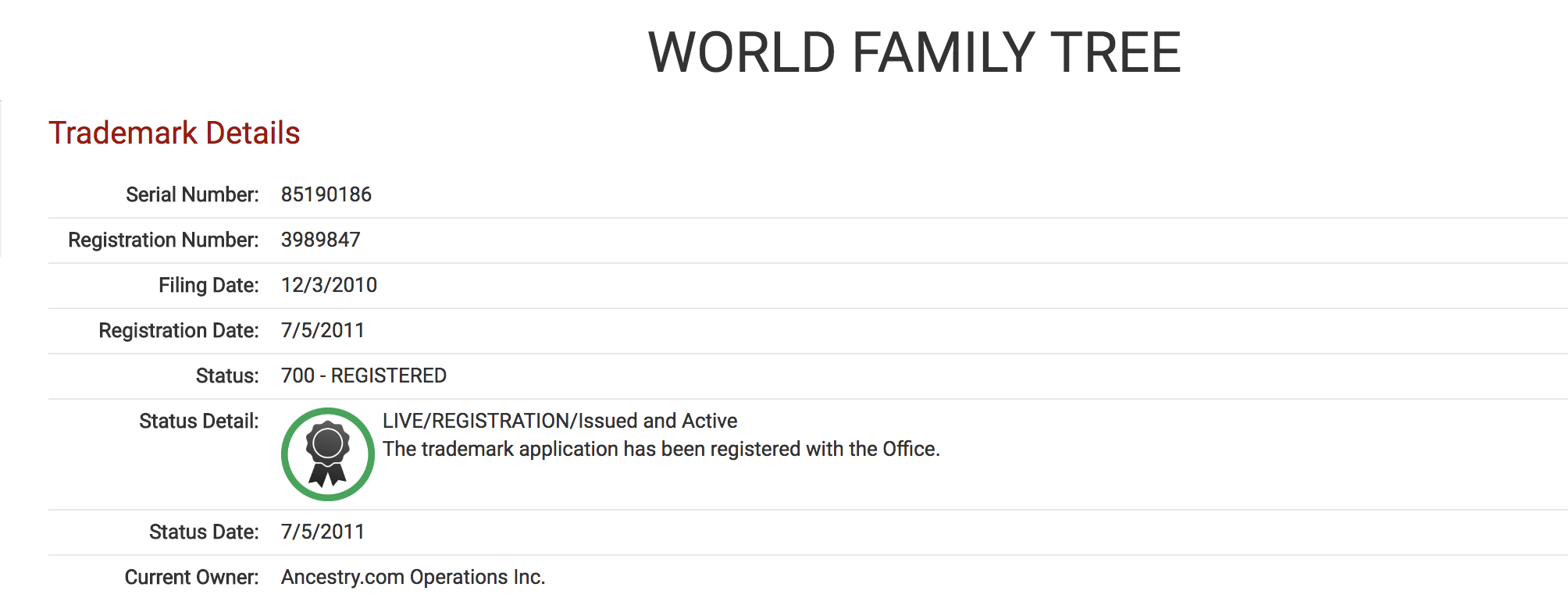
Source: ktMINE IP Platform contains millions of trademarks and assignments
Ancestry.com has already used some of their patented technology–using identity-by-descent to discover population structures–to perform and publish novel research about migration and settlement patterns in post-colonial American communities. According to Ancestry’s press release announcing the publication of this research,
“Ancestry is well on the way to harnessing the scientific power of its two unique data sets — the combination of the records of history in our genetics, coupled with paper records of family history. Such research can not only provide personal stories, but also the context of ties between people, places, and human events, allowing people to understand their identities even more deeply. The Ancestry team continues to study ethnic diversity, migration patterns, human evolution, and the history of our species to uncover connections among mankind.”
Continued Growth in Genetics and Genealogy
Despite concerns about direct-to-consumer genetic testing–from questions of user privacy to debates on the level of sophistication of the technology used for it–growth of the genomics industry seems unlikely to slow anytime soon. According to the MIT Technology Review, the number of people who had their DNA analyzed with at-home genetic tests was higher in 2017 than in all previous years combined. Direct-to-consumer genetic testing has encouraged a boom in related industries, too; an increasing number of people are participating in genealogy tourism, one of the fastest growing travel sectors.
One recent poll reported curiosity about genealogical history as the most common reason why people choose to order genetic testing, and this curiosity will probably prove to be a sustaining force for the industry. “Heredity is who we are,” says science writer Carl Zimmer in an interview with NPR, and human fascination with our personal history and ancestry (and even that of our pets) will only increase as technology starts providing more detailed information about the answers that might be buried in our genetic code.





